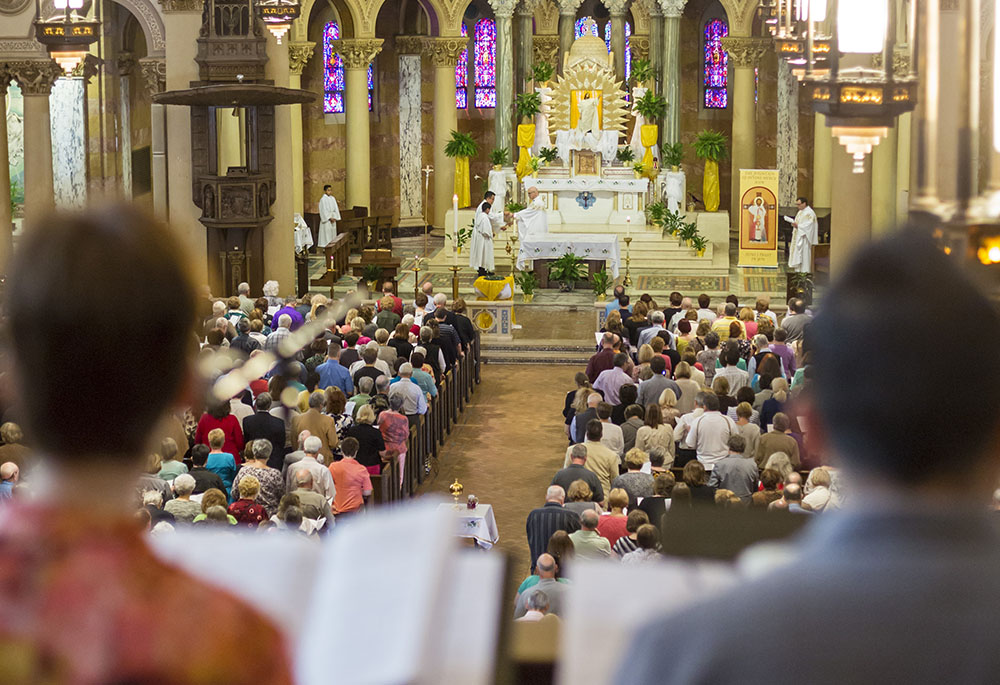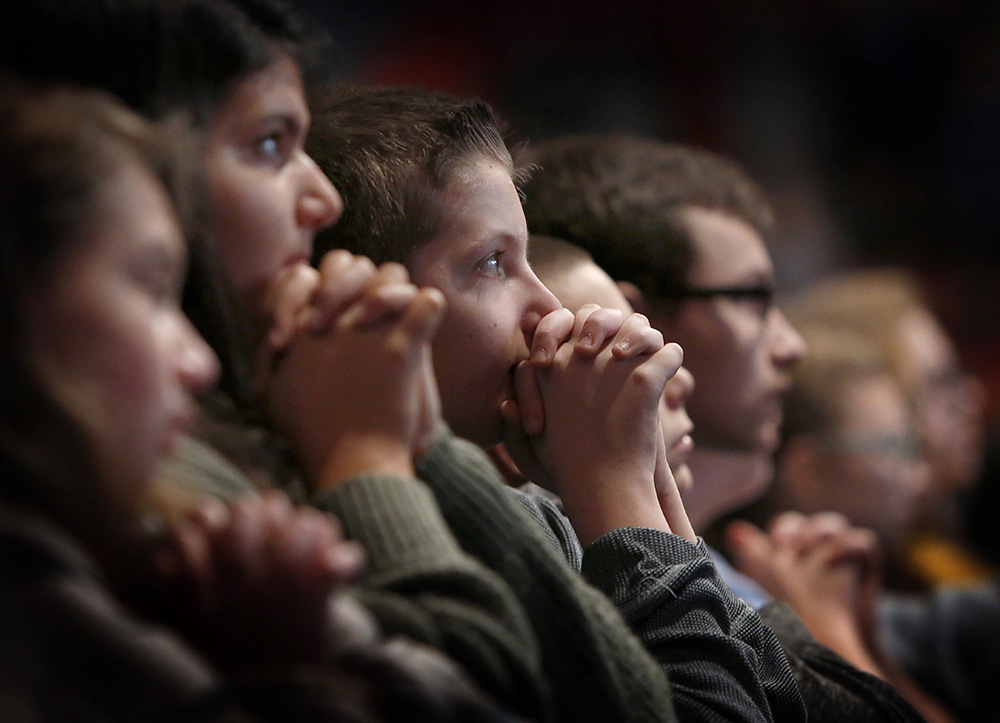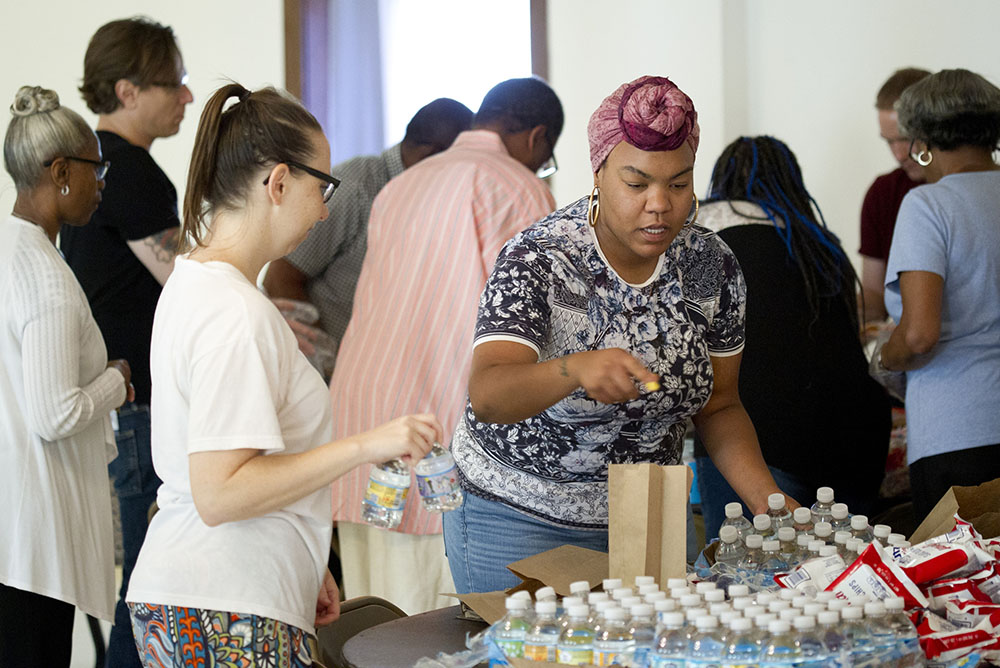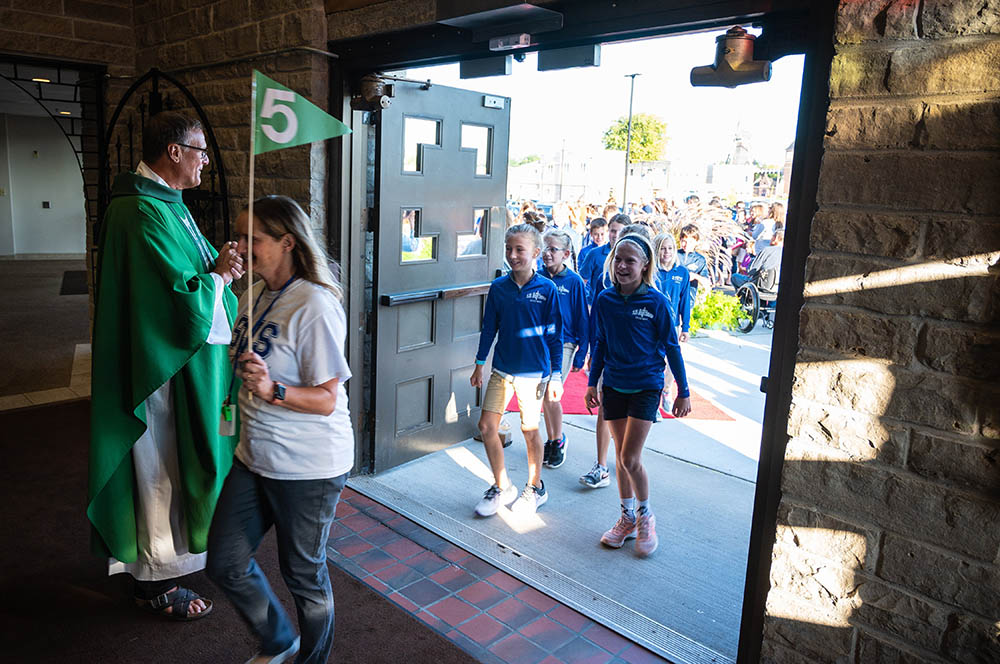
People pray during Mass April 17, 2016, at Holy Redeemer Church in Detroit. The Mass was the site of a "Mass Mob" event, an evangelization effort aimed at boosting regular Mass attendance. (CNS/Jim West)
"Evangelization" has been a buzzword for U.S. parishes and dioceses for some years now, in part in response to declining Mass attendance and the absence of large swaths of young people from church life. Every diocesan mission and vision statement suddenly has "evangelization" at the top of its list of goals.
Lay ministers, particularly those leading adult faith formation or the Rite of Christian Initiation of Adults, are finding evangelization initiatives stapled to their long list of job duties. More forward-thinking parishes and dioceses are hiring evangelization directors, tasked with training "missionary disciples" and reevangelizing committed Catholics, reconciling with ex-Catholics and somehow reaching out to all those who may never walk in a church, let alone grab a parish bulletin.
And the Catholic media industry is pivoting toward creating evangelization programming with ready-made video series and formation events. There is a lot of money to be spent (and made) on evangelization efforts.
All for good reason, as anyone with an eye on the demographic data can see. We are gazing upon a very real future of empty churches, shuttered schools and shrunken dioceses.
Anecdotally, I'm sure we can all recount friends and family members who are now former Catholics, sometimes proudly. Of a longtime friend group of about 20 people, all of whom went to Catholic grade schools and high schools, maybe four of us are sending their kids to Catholic schools and consider ourselves active Catholics.

Students from St. Alphonsus/St. Patrick Catholic School in Lemont, Illinois, pray Oct. 19, 2019, during Holy Fire Chicago youth event. (CNS/Chicago Catholic/Karen Callaway)
Most of the others followed the same patterns illustrated in the groundbreaking 2017 CARA report "Going Going Gone: Dynamics of Disaffiliation in Young Catholics." Some were injured by the church, some dissented with church teaching, and others just drifted away and lost interest.
The data also indicate that the No. 1 reason a young Catholic will stay Catholic is if they have a lived relationship with God in Christ, and that they experience this relationship as enhanced or enriched by the church community. Even among people of deep spiritual longing, there is no social or cultural pressure to be Catholic or to attend Mass. In fact, there is a fair bit of pressure not to do those things.
While I love the new focus on evangelization, there are problems with the way we sometimes want to implement it. Often our evangelization efforts are linked with a bad theology that undergirds clerical attitudes toward ministry (from both clergy and laity), which in turn lead to a colonial approach to evangelizing (or conquering and subduing) a secular world.
Advertisement
Couple this with the arrival of many evangelizers (both lay and clergy) who were formed and commissioned with an ossified sense of the tradition and their own place within it, and interwoven with a renewed (and thoroughly misguided) interest in the two-tiered Thomism of Neo-Scholasticism, and you get a recipe for stifling any authentic evangelizing spirit.
This two-tiered approach overemphasizes the distinction between grace and nature to the point of believing that there is some small, pure, perfect "church" within the wider Catholic Church. This "church" is made up of "real" Catholics, who follow a sort of fundamentalist version of Catholicism and, ironically, often openly disagree with the pope, and then there is everyone else.
But when we attempt to evangelize from this perspective, we lose the core of the Gospel message (that is, God's infinite, unequivocal love for us becoming incarnate in the person of Jesus Christ) and replace it with a sort of moral and liturgical purity code.
Moreover, we start to look less like a church, a complex and interconnected community of faith, hope and charity, and more like a multilevel marketing scheme trying to coerce or manipulate people into believing and acting like we'd prefer they would. We gloss over the complexities of people's lives and separate everything into "from God" or "from the secular world," and fail to acknowledge that God is already at work in people's lives long before they step into a church.
If our public witness isn't always evangelizing in a broad sense, we are just another private country club, another gated community in a world of increasingly growing inequity and isolation.
Worse still, many would-be evangelizers speak quite openly about correcting the "mistakes" of the Vatican II generation of Catholic priests and laity, who often tried to meet people, and the culture, where they are at. Whether or not they perceive the empowering of the laity for the evangelization and consecration of the world — a key piece of both the new evangelization and the 1962-65 Second Vatican Council (and I would add, the Gospel of Jesus Christ) — as part of the "mistakes" they seek to correct remains to be seen.
But the data on evangelization is clear: When the laity aren't formed, empowered and actively participating in their parish communities, they leave, joining the growing throng of nones or finding another place of worship that includes them in the work of redemption. In short, the rise of this new colonial/clerical/Neo-Scholastic approach isn't just an intra-ecclesial issue, it's an existential one.
A better approach to evangelization, from both a theological and sociological standpoint, would be to realize that everything we do as Catholics is a touchpoint of evangelization. We evangelize through the way we welcome people every Sunday to Mass; how we treat our friends and family; how we spend our money as individuals, parishes and dioceses; how those same groups care for the poor and reach out to those on the margins; and how we disagree and dialogue with one another.

Parishioners at Holy Name of Jesus Church in Washington pack lunches for the poor June 25, 2017. (CNS/Jose Montoya)
If our public witness isn't always evangelizing in this broad sense, we are just another private country club, another gated community in a world of increasingly growing inequity and isolation.
I'm with James Joyce when it comes to my understanding of the Catholic Church: "Here comes everybody." And so I'm continually inspired by the vision of the church articulated in the documents of Vatican II: the people of God walking together, in community, consecrating the world to God in Christ as we share "the joys and hopes, the griefs and anxieties" of all those we walk with.
It's a vision of a pilgrim church that resonates richly with my lived experience of a fruitful collaboration between laity and clergy, of a dynamic interrelation and interpenetration of nature and grace, and of our call to awaken to God's incarnate presence both within and beyond the sacramental life of the church, and accompany that presence into the social, economic and existential peripheries of our world. This is where Christ longs to be seen and encountered, and where people long for healing, opportunity and meaning. This is our mission territory: to bind up all that are broken.
Pope Francis dreams of our local parishes being "islands of mercy in an ocean of indifference." That's my dream too. Parish life, as ordinary and unglamorous as it often is, has much to offer our world: the stability and diversity of our communities; the opportunities for self-transcendent service; the potential for intergenerational dialogue and the sharing of wisdom; and the prophetic call to remain united in community, indeed, in communion, with Christ and with one another in a world that divides us up by ideology. And that isn't even speaking yet of the richness of our sacramental and liturgical lives together.

Fr. Ron Belitz, pastor of St. John Nepomucene Parish in Little Chute, Wisconsin, greets fifth graders from St. John Nepomucene School Sept. 10, 2021, as they enter the church for the first all-school Mass. The school and parish rolled out a red carpet at the church entrance as a welcome to students and faculty. (CNS/The Compass/Sam Lucero)
All of these provide a pathway for cultural and social healing, and a true evangelization that liberates, heals and redeems peoples and communities. We have many wonderful gifts to give the culture, and the culture has many wonderful gifts to give to us. This holistic, synodal and local approach creates a natural attractiveness to our faith, and also means we don't have to rely on coercive or manipulative means to evangelize, invite and heal people.
In the midst of all this, the 2021-23 synod on synodality has asked us to create an intentional time to reflect together on becoming a more dialogical, loving and listening church. This is a true evangelical initiative, and possibly the answer to a lifetime of silent prayers spoken by all those who feel they need to turn their back on our church to find a deeper relationship with God.
The synod is still scandalously on the backburner in many U.S. dioceses, but the parishes and dioceses that are thriving right now are those that are welcoming, loving and listening. In short, they are synodal: laity and clergy walking together, growing ever closer in friendship with one another and with Christ as they reach out to those on the margins and serve.
If we want to implement the new evangelization, we need to look no further than ourselves and our communities, and to all those who feel left out of them. In short, if we want to authentically proclaim the good news, then we have to become the good news. And if that's the case, we all have a lot of work to do, together.







